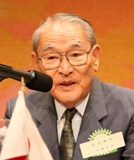��Eiichi Shibusawa, Alive in the Contemporary��
August 6, 2008
Mr. Masahide Shibusawa,
President,
Shibusawa Eiichi Memorial Foundation
 ��76 years having now past since his death, Eiichi Shibusawa is already a historical figure. However, his life and accomplishments still attract contemporary interest.
��76 years having now past since his death, Eiichi Shibusawa is already a historical figure. However, his life and accomplishments still attract contemporary interest.
��One of the reasons for the long lasting attention drawn to Eiichi Shibusawa is that, in addition to being a founder and manager of companies, his versatile activities reached all aspects of Japanese people��s lives, including social welfare, international relations, education, culture, etc. Another point to make is that a large part of the issues he worked on at the time are closely tied to contemporary society. Many aspects of the 91 years of Eiichi��s life and Japanese modern history are intertwined like two sides of one coin.
What I would like to first discuss is Eiichi Shibusawa��s image as the pioneer of Japanese modernization.
At the end of the Edo era, Eiichi spent over a year in France, where he had the opportunity to closely observe the structure and functions of a modern nation. In 1869, he was recruited to work for the new Meiji government. As the chief of the Reform Office of the Ministry of Civil Affairs, Eiichi created the majority of the proposals that became the foundation of creating a modern nation, by developing plans for 35 types of systems, including the reform of the standards of weights and measures, a national land survey, establishment of the Japanese postal system, creation of railroads and the establishment of tariff rates.
Eiichi also proposed the exchange of feudal clan currency notes at fair value when the clan system was abolished and replaced by the prefecture system, and placed the order for the necessary 50 million yen of banknotes to be printed in Germany.
A particularly notable feature of Eiichi��s activities was his outstanding ability to convince others. In 1874, Eiichi resigned from his position in the government and became the general superintendent of Japan��s First National Bank, which was a western style private-sector financial institution that, at the time had just been founded.
��Japan��s first manufacturing company, Oji Paper Co., Ltd., was founded in 1874 with a capitalization of 500 thousand yen, based on Eiichi��s idea that there would be demand for printing banknotes, government bonds, newspapers, magazines, etc. It took ten years for the company to become profitable. Believing in Eiichi��s sincerity and the correctness of his objectives, the company��s shareholders endured a long period of no dividend distributions and even responded to repeated requests for additional capital to cover losses. As a result, Oji Paper grew to be one of Japan��s leading companies.
The third notable point is Eiichi Shibusawa��s significant commitment in overcoming the idea that the government and bureaucrats were superior to the private sector and ordinary citizens, and the realization of social change.
Business managers at the time were steeped in the class-based discrimination succeeded from the Edo Era, and did not respond well to Eiichi��s proposals. Eiichi spent seemingly an endless amount of time and energy to explain macro-economic developments and the reality of competition with foreign countries to fellow bankers, and repeatedly advocated the need for a framework to promote their own business interests while at the same time promoting national interests. Eventually, industry-based networks such as the bankers�� association, chamber of commerce, the stock exchange, etc., were developed and the term ��financial community�� was coined. Even the government was no longer able to ignore the opinion of the financial community and became no longer able to force its policies upon it.
��For Eiichi, the founding and management of companies was a means to foster the emergence of modern Japan. He was involved in the foundation and management of 470 companies, in some of which he invested his own funds. Once a company was founded and he saw that business was going smoothly, he often sold his ownership stake and used the funds to assist other new companies. It appears that he did not have a strong desire to make a company his own, but was instead committed to the role of the promoter or sponsor of Japan��s modernization.
Eiichi Shibusawa��s other achievements include the management of Tokyo Yoiku-in, a welfare institution which succeeded the system to provide relief to the poor, the founding of the Shoho Koshujo (Institute of Business Training), which later became Hitotsubashi University, and the development and support of many educational institutions. Some of his unusual achievements include the recovery of the former shogunate Yoshinobu Tokugawa��s public status and the compilation of Yoshinobu��s eight-volume biography, Yoshinobu Tokugawa Koden. Completing this biography took 33 years, and records show that Shibusawa paid all the expenses himself.
��The fact that Eiichi Shibusawa continued serving his role of what may be called the caretaker of the financial community, without losing his brilliance until the end, would have been something welcomed not only by the business community, but by society at large at the time.
I believe that the way he lived is one of the reasons behind how Eiichi��s intriguing popularity continues to this day, 76 years after his death.